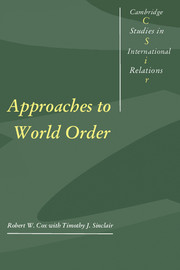Book contents
- Frontmatter
- Contents
- Preface
- Acknowledgements
- Part I Overviews
- Part II Theory
- Part III Interpretations
- Part IV Multilateralism
- 16 The executive head: an essay on leadership in international organization (1969)
- 17 Decision making (with Harold K. Jacobson) (1977)
- 18 Ideologies and the New International Economic Order: reflections on some recent literature (1979)
- 19 Labor and hegemony (1977)
- 20 Labor and hegemony: a reply (1980)
- 21 Multilateralism and world order (1992)
- 22 Globalization, multilateralism, and democracy (1992)
- Complete bibliography of works by Robert W. Cox to 1995
- Index of names
- Index of subjects
- CAMBRIDGE STUDIES IN INTERNATIONAL RELATIONS
22 - Globalization, multilateralism, and democracy (1992)
Published online by Cambridge University Press: 05 June 2012
- Frontmatter
- Contents
- Preface
- Acknowledgements
- Part I Overviews
- Part II Theory
- Part III Interpretations
- Part IV Multilateralism
- 16 The executive head: an essay on leadership in international organization (1969)
- 17 Decision making (with Harold K. Jacobson) (1977)
- 18 Ideologies and the New International Economic Order: reflections on some recent literature (1979)
- 19 Labor and hegemony (1977)
- 20 Labor and hegemony: a reply (1980)
- 21 Multilateralism and world order (1992)
- 22 Globalization, multilateralism, and democracy (1992)
- Complete bibliography of works by Robert W. Cox to 1995
- Index of names
- Index of subjects
- CAMBRIDGE STUDIES IN INTERNATIONAL RELATIONS
Summary
I am particularly grateful for quite personal reasons to be able to give the John Holmes Memorial Lecture. It was John Holmes who opened the way for me to return to Canada after some thirty years away. During that time, Canada had become for me more of an idea than a place on the map, an idea embodied in a few people amongst whom John Holmes was an archetype.
He was a diplomat, an historian, and a master craftsman of the English language. He had that sense of duration that gives precedence to the long run over the immediate and transitory. He valued cooperation more than competition. He had a firm sense of right and wrong, but he expressed this through what Max Weber called an ethic of responsibility – always concerned in the first place about the effects of a word or an action, forsaking the satisfactions of self-proclaimed moral rectitude. He was intimately involved in the Cold War from its very beginnings in the Gouzenko affair but he never succumbed to the Manichaeism that corrupted politics and distorted mentalities for two generations.
Holmes spoke somewhat ironically about “middlepowermanship” as the vocation of Canadian foreign policy. He did not mean to suggest that there is a special virtue in being neither too big nor too small. Middlepowermanship really had nothing to do with size.
- Type
- Chapter
- Information
- Approaches to World Order , pp. 524 - 536Publisher: Cambridge University PressPrint publication year: 1996
- 11
- Cited by



